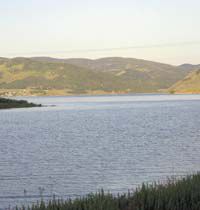| The water levels at Scofield Reservoir show significant improvement compared to the storage totals reported during the recent six-year drought cycle. Although the drought appears to have concluded, state officials have launched an educational campaign to promote continued conservation. |
Public officials started one of Utah’s largest water conservation campaigns on Friday after concerns were raised on record-breaking temperatures in the state and future population increases.
With the end of six years of drought in the state, Lt. Gov. Gary Herbert and other public officials are concerned that Utah residents may become wasteful with water usage during the summer months.
In an attempt to alleviate potential problems, the state officials decided to start a new statewide campaign to educate Utah residents on water conservation.
Currently, Carbon County is experiencing dryer than normal conditions even with this year’s excess rainfall.
Drought conditions at locations across the state are evaluated regularly by the Utah Division of Water Resources and reported to the governor.
Herbert is concerned that with snowpacks and heavy rainfalls residents might think they no longer need to conserve.
The newly launched campaign will promote water conservation to all Utah residents and will include newspaper inserts, television and radio commercials, printed brochures and a 30-minute infomercial.
Free water checks through the governor’s water conservation team will also be available for residents of the state as well as businesses and institutions.
The governor’s conservation team will assess soil types, conduct an analysis on irrigation systems and provide customized watering schedules along with conservation tips during thes checks.
Also a possibility for the future are increases in water costs, along with tougher city ordinances and even the offering of rebates to residents who purchase water conserving appliances for their homes.
In rural areas like Carbon County with acres of farmland, water conservation is extremely important to agricultural producers and ranchers who use more water than most businesses and residents.
The University of Utah’s Bureau of Economic and Business Research ranked St. George first in a recent report on per capita water use of 25 major cities in the Intermountain West.
Logan and Salt Lake City also made the top five in the list.
Utah currently consumes about 293 gallons of water per person per day, second to only Nevada.
If Utahns reduce consumption of water 25 percent by 2050, they will conserve 400,000 acre-feet of water each year.
Low water landscaping in new residential developments is being promoted by the state for St. George. Increases in water costs are also expected as populations grow and water reserves diminish.
An increase of 1.3 million people in the state who will be needing water is expected over the next 20 years. The state expects water demands over the next 30 years to increase by 70 percent. Water conservation will need to be relied upon to deliver the extra water necessary to the growing population.
With Utah’s arid climate, residents frequently water their yards to keep them lush. Most residents apply more water than necessary. Landscapes and yards currently consume nearly half of the state’s municipal water supply.
Since 65 percent of water is used outside, residents can help conserve water in many ways during the summer.
Not watering lawns between 10 a.m. and 6 p.m. is an easy way of avoiding excess water use. Most water used during this time will evaporate.
Even during the hottest weather, lawns only need to be watered twice a week. Brown spots on lawns should be hand-watered instead of over-watering the entire lawn.
Look for a bright yellow tag when shopping for plants. This indicates a water-wise plant.
Residents should also make sure that sprinklers are watering the grass and not the sidewalk or nearby cement.
Water conservation is beneficial for all residents. Not only will water bills drop when residents conserve water, but gas and energy bills will also decline as residents heat less water.
Additional water saving tips can be found at the Division of Water Resources web site, www.conservewater.utah.gov.

